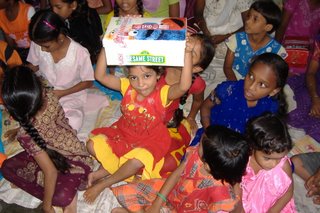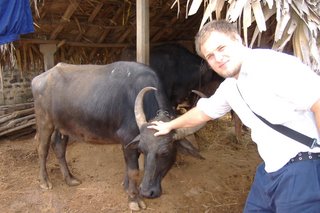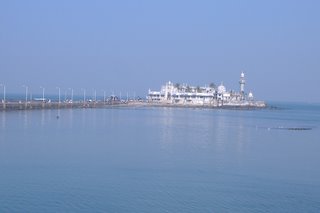(disclaimer: my comments on "Indian culture" and the like are based on my observations, and people telling me stuff, not statistics or objective study or anything. Probably not true in all places in all cases.)
So, we've spent a couple of days touring villages. Despite the enormous cities in India (1 million people rates a "town"), the majority of people still live in rural villages. The villagers grow their own food and/or work as daily wage laborers on the farms of the wealthy few. Visiting them (with several area pastors) is an experience to remember. The pastor at the children's mission also leads a program that builds parsonages and trains evangelists, and he and his compatriots go to "visit the flock" whenever they have guests, once every few months or so.
A typical village visit goes something like this:
1: We drive the the village by taxi. My mom mentions the insanity of the traffic roughly once for every 7 minutes of driving. All of us roll down the windows to take pictures, undoubtedly looking very stupid.
2: We arrive and walk to the parsonage (pastor's home, plus church hang-out place). The parsonages, like the other houses, are simple structures with a couple of rooms. They have electric lights and- importantly- celing fans, but few modern conveniences. These people don't have much. They- being Indian Christians- are also a huge minority in the country. The majority Hindus are usually, but not always, content to let the Christians do their own thing. Some Hindus will even come to the church gatherings.
3: The villagers line up enthusiastically to greet us. We are given garlands of colorful flowers, a traditonal method of greeting. Everyone is grinning wide, waving and cheering and laughing. You put your hands together straight up and down, bow a little, and say "namaste" to greet them in the traditional style. We were very uncomfortable with all the attention.... the pastor's non-PC (but it seems to be very true) comment that "one white person makes an entire village happy" didn't help. Finally we realized that the villages really do love to have guests, and are basically looking for an excuse to celebrate, so we decided to enjoy being Rock Stars for a couple of days.
4: There is generally some sort of church worship. Long, somewhat redundant (especially if you can't understand) songs are sung in Telegu, the local language. (There is no language called "Indian", rather there are a plethora of them. The most common is Hindi.) A pastor speaks, messages ranging from a short greeting to a full fire-and-brimstone, yelling every sentence type sermon. (The pastor yelling in English is very quite funny, as he crechendo-decrechendos at the end of every sentence. "You must accept the Lord JEEEsus!") One of the "honoured visitors" has to give a short greeting and Bible reading, with translation from a pastor.
5: Food! The villagers get to feast, but we are served first. In India, being a good host is of vital importance socially, and serving food is 1a on the list. People bring you water to wash your hands, bottled water (it is common knowledge, I guess, that foreigners are too pansy to handle Indian tap water), and fill plates with food. They will continue to fill your plate once it becomes even remotely empty. This makes eating a tricky venture when visiting 4 or 5 villages in a day. It is rude to eat nothing, but downright gluttonous to eat a full meal every time. (I might have taken the eating challenge, if nor for my wanting to get back into shape. As well, it seems poor form to stuff yourself with food the villagers could otherwise eat.) And yes, it's the women who cook and serve food. A lot of them also work in the fields with the men. Tough girls.
6: "Playing" with the kids... they are shy at first, but once you approach them with a smile they can't get enough of the attention, though the only Englsh the little ones speak is "my name is". They take great pleasure in our attempts to pronounce their multisyllabic names. The magic of digital cameras lets us take pictures and then show them to the kids (and delete later if necessary). The kids get an unbelievable kick out of this and swarm you like happy puppies, smiling and laughing and shaking hands. I started taking flowers from the garlands and putting them in the hair of little girls. They smiled, put their hands to their faces, and beamed. It was great.
The younger women get in on the action too, waving their babies and asking to get their picture taken. They are so slight of build that I constantly worried that I would accidentally pat a mother on the head. Only the men stand back, polite and even friendly, but the young ones seem a little wary. Perhaps they want us to realize that it is THEIR women and children we are playing with.
7: Leaving, followed by waving, cheering throngs. It was bizarre, I felt like Angelina Jolie. Incidentally, the funnest part of the day was when I actually got to do something useful... Our driver got one of our 2 vehicles thoroughy mired in thick greasy mud. Since the villagers don't have cars and the pastors don't have mud, no one had the slightest idea what to do, so I got to more-or-less run the show. We roped the two vehicles together to pull the stuck one out, and the drivers almost blew out the engine on the first one. He gunned it hard, while the second driver did not bother to even turn the stuck vehicle on! A quick explanation of "drive forward with BOTH cars- and other people push" later, and we were on our way.
The villages are hard to describe in their awesomeness, so I will try to upload pics at some point. Small, crumbling houses, roofed with leaves, are surrounded by lush tropical greenery. The women and girls are dressed in bright colors, somehow keeping their Saris spotless. There are animals everywhere- manegy feral dogs looking for scraps, chickens nervously bickering in the dirt, a wobbly-legged calf chasing the chickens, and the placid water buffalo everywhere. These buffalo are more like cows than their savage African cousins, easily herded with the tap of a stick.
The sheer entusiasm of the villagers is mind-boggling. I am reminded that we generally equate "developing world" with "horrible suffering"... and certainly, suffering happens. If a villager can't get work, or his crops fail, food becomes immediately scarce. Many people can not afford medical treatment. After typing up the stories for many kids .I am acutely aware of what can go wrong. However, when things are going well, they seem perfectly content, even joyful, with their "simple" lives. Theu don't need a ton of stuff. They are thin but don't look starving. (Incidentally, most people here are naturally pretty small. It feels very strange to be tall for once. Those that eat to much get the amusing skinny-fat physique: narrow shoulders and a big belly.)
I was also impressed by how hard the children work. It is perfectly acceptable for an adult to ask a child- any child- to get him something, and the child obeys without question. However, the kids do not seem to be intimidated or bullied into doing it. They work with smiles on their faces, and it is clear that their parents (the vast majority, anyway) love them very much.
The only part I didn't like was being made to feel very soft. It feels very wussy to get treated like a king; sitting there getting fanned by a 10 year old girl is slightly rediculous. As is getting your feet washed by hand because they are muddy. As is getting asked "are you too hot? Do you need a rest?" after a 10 minute walk. I wanted to scream at the guy: "I used to carry trees up moutains in this weather! Am I made of freaking glass?"
As far as our doing any work? Apart from bringing joy from our glorious presence, well, yes, we are. We are writing a bunch of letters to sponsors, doing videotaping and scripting for promotional DVD's, and taking pictures of children for the files. Yesterday we went assembly line style through a hundred kids or so at a school: Line up, snap picture, next! The strategy of the Mission people is becoming clear, and it's a pretty good one: make us feel welcome, make us feel part of the work, so that we will want to support, and send more people to the mission in the future. Works for me.
Finally, I am speaking in the English service on Sunday. If you are the praying type, I would appreciate you offering up some on my behalf.














